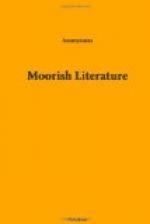But when it nearer came, she turned away, in half despair,
Her vision had deceived her, Bencerraje was not there.
“My own, my Bencerraje, if but lately you descried
That I was angry in my heart, and stubborn in my pride,
Oh, let my eyes win pardon, for they with tears were wet.
Why wilt thou not forgive me, why wilt thou not forget?
And I repented of that mood, and gave myself the blame,
And thought, perhaps it was my fault that, at the jousting game,
There was no face among the knights so filled with care as thine,
So sad and so dejected, yes, I thought the blame was mine!
And yet I was, if thou with thought impartial wilt reflect,
Not without cause incensed with thee, for all thy strange neglect.
Neglect that not from falseness or words of mine had sprung
But from the slanderous charges made by a lying tongue;
And now I ask thee pardon, if it be not too late,
Oh, take thy Zaida to thy heart, for she is desolate!
For if thou pardon her, and make her thine again, I swear
Thou never wilt repent, dear love, thou thus hast humored her!
It is the law of honor, which thou wilt never break,
That the secret of sweet hours of love thou mayst not common make.
That never shouldst thou fail in love, or into coldness fall,
Toward thy little Moorish maiden, who has given thee her all.”
She spoke; and Bencerraje, upon his gallant bay,
Was calling to her from the street, where he loitered blithe and gay,
And quickly she came down to him, to give him, e’er they part,
Her rounded arms, her ivory neck, her bosom, and her heart!
ZAIDE REBUKED
“See, Zaide, let me tell you not
to pass along my street,
Nor gossip with my maidens nor with my
servants treat;
Nor ask them whom I’m waiting for,
nor who a visit pays,
What balls I seek, what robe I think my
beauty most displays.
’Tis quite enough that for thy sake
so many face to face
Aver that I, a witless Moor, a witless
lover chase.
I know that thou art a valiant man, that
thou hast slaughtered more,
Among thy Christian enemies, than thou
hast drops of gore.
Thou art a gallant horseman, canst dance
and sing and play
Better than can the best we meet upon
a summer’s day.
Thy brow is white, thy cheek is red, thy
lineage is renowned,
And thou amid the reckless and the gay
art foremost found.
I know how great would be my loss, in
losing such as thee;
I know, if I e’er won thee, how
great my gain would be:
And wert thou dumb even from thy birth,
and silent as the grave,
Each woman might adore thee, and call
herself thy slave.
But ’twere better for us both I
turn away from thee,
Thy tongue is far too voluble, thy manners
far too free;
Go find some other heart than mine that
will thy ways endure,




